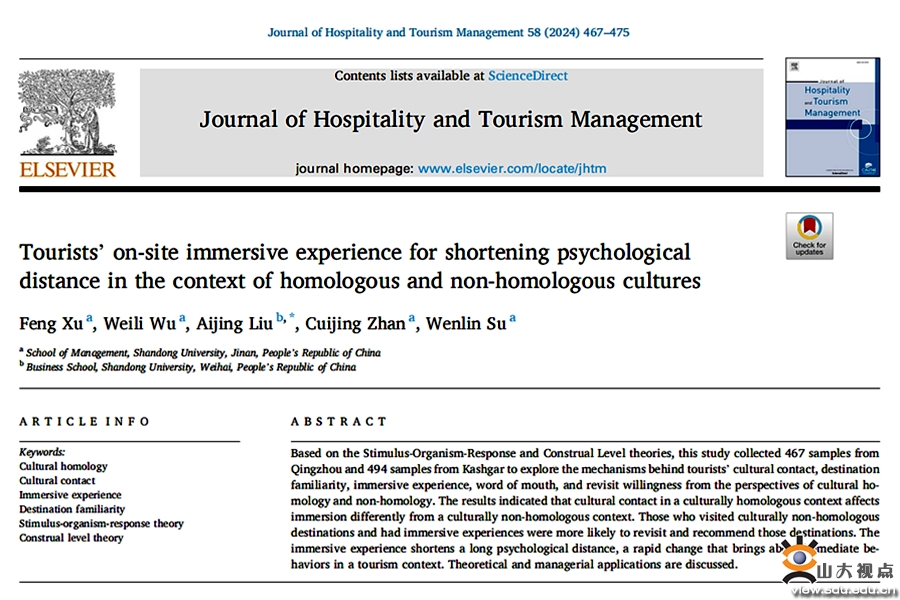Recently, Professor Xu Feng at the School of Management and Associate Professor Liu Aijing at the School of Business published the latest research “Tourists’ on-site immersive experience for shortening psychological distance in the context of homologous and non-homologous cultures” online in the international academic journal, Journal of Hospitality and Tourism Management. The journal is the official journal of CAUTHE (Council for Australasian Tourism and Hospitality Education Inc.), SSCI 1, Impact Factor 8.3. Professor Xu Feng is the first author, Professor Liu Aijing is the corresponding author, Wu Weili, Master’s degree student of the School is the second author, and Shandong University is the first author and the only corresponding author affiliation.

In recent years, tourists have gradually begun to seek immersive experiences in cultural venues, and younger groups, in particular, aspire to immersive experiences in cultural venues such as museums, theme parks, and heritage sites. The research team found that the differences in tourists’ behavioral responses to different cultural destinations are closely related to the homologous or non-homologous relationship between tourists’ own cultures and destination cultures. Based on the SOR theory, the relationship between homology cultures&non-homology cultures and immersive experience, cultural contact, and tourists’ behavioral intention was constructed by using the construal level theory. And based on the Ancient City of Qingzhou and Kashgar Old Town, research was carried out on the influence of cultural contact on tourists’ behavioral intention through an immersive experience.
The study confirms that cultural contact brings immersive experience, which explains the success of Grand Tang Dynasty Ever Bright City. Meanwhile, the study found that the immersive experience would shorten the psychological distance in the context of non-homologous cultures, and the significant change in the psychological distance increased tourists’ willingness to revisit and recommend the destination, providing valuable suggestions for promoting the integration of culture and tourism and enhancing the attractiveness of cultural destinations.
The study was supported by the Natural Science Foundation of Shandong Province (ZR2023MG010) and the Fund for the Cross-integration Innovation Research Team of Culture, Tourism and Wellness Industry of Shandong University (2020QNQT019).
Xu Feng is a professor and doctoral supervisor at the School, one of the first national young experts in tourism industry, an excellent expert of the Ministry of Culture and Tourism of the PRC, and a key young and middle-aged expert in the field of culture and tourism research in Shandong Province. He has presided over/participated in a total of 9 national, provincial, and ministerial research projects; published more than 60 academic papers in Nankai Business Review, China Soft Science, Economic Management, Tourism Tribune, Journal of Destination Marketing & Management and other journals.
Liu Aijing is an Associate Professor at the School of Business, Shandong University. She has presided over/researched 1 project of the Shandong Social Science Planning on Culture and Tourism, and has published more than 10 academic papers in Journal of Sustainable Tourism, International Journal of Contemporary Hospitality Management, Journal of Hospitality and Tourism Management, Journal of Destination Marketing and Management, International Journal of Hospitality Management and other journals.